3 more hostages’ remains returned as Hamas reasserts control in Gaza, potentially threatening truce
Israel has identified the remains of three more hostages following a second release by Hamas on Tuesday, bringing the number of deceased hostages in Gaza to 21.
But even as the conditions of the first phase of the ceasefire agreement were still being met, both President Donald Trump and Israeli Prime Minister Benjamin Netanyahu indicated that further fighting could be in the future if Hamas does not move forward with disarming — as footage from Gaza shows it is far from doing.
The three hostages whose remains were returned were Uriel Baruch, Eitan Levy and Tamir Nimrodi. Nimrodi’s death had not previously been confirmed, though Israeli authorities said there was “grave concern” about his condition. The Hostages and Missing Families Forum said he had been abducted alive but was subsequently killed in an Israeli airstrike.
A fourth set of remains sent to Israel was not that of a hostage and likely came from a Gazan, officials said DNA analysis showed.
More remains could be released on Wednesday as Hamas faces calls to hold up its end of the deal struck last week, which required the return of all 48 Israeli hostages. All 20 living hostages and four deceased hostages were released on Monday.
U.S. President Donald Trump, who pressed for the deal, called attention to Hamas’ delay in returning the deceased hostages in a post on Truth Social on Tuesday. But he also said that the second phase of the ceasefire, in which a lasting peace and plan for Gaza’s future governance is supposed to be negotiated following the release of all hostages, was already underway.
“ALL TWENTY HOSTAGES ARE BACK AND FEELING AS GOOD AS CAN BE EXPECTED. A big burden has been lifted, but the job IS NOT DONE,” Trump wrote. “THE DEAD HAVE NOT BEEN RETURNED, AS PROMISED! Phase Two begins right NOW!!!”
Meanwhile, footage showed Hamas operatives emerging from hiding in Gaza and reasserting themselves in the enclave, including by executing those seen as having opposed Hamas during the war with Israel.
Trump’s peace proposal called for Hamas to disarm and not play a role in governing Gaza, but the group has not agreed to those terms. Trump said before traveling to Israel on Monday that Hamas had been given temporary approval to act as a police force in Gaza.
“Well, they are standing because they do want to stop the problems, and they’ve been open about it, and we gave them approval for a period of time,” he told reporters.
On Tuesday, he said the show of force “didn’t bother me much, to be honest with you,” because the group had targeted rivals “that were very bad.”
But both Trump and Israeli Prime Minister Benjamin Netanyahu indicated that a long-term failure to demilitarize by Hamas could risk a return to fighting.
“They’re going to disarm, and because they said they were going to disarm. And if they don’t disarm, we will disarm them,” Trump told reporters at the White House on Tuesday. He was then pressed on how he knew the group would do something it has said it would not do.
“I don’t have to explain that to you, but if they don’t disarm, we will disarm them. They know I’m not playing games,” Trump said. “If they don’t disarm, we will disarm them, and it’ll happen quickly and perhaps violently. But they will disarm.”
Netanyahu told CBS News that he understood Trump’s comments to be a version of the threats Trump made on social media that coincided with a ceasefire deal moving forward: Disarm or “all hell breaks loose,” Netanyahu said.
The Israeli prime minister said he hoped it would not come to that. “We agreed to give peace a chance,” Netanyahu said, adding, “I hope we can do this peacefully. We’re certainly ready to do so.”
With hostages home, the filmmaker behind ‘Torn’ says his documentary about NYC’s poster wars remains sadly relevant
What caught Nim Shapira’s eye when videos of New Yorkers tearing down posters of Israeli hostages began circulating in October 2023 wasn’t just the stark affront. It was also the poles the posters had been attached to.
“I recognized every corner,” he said. “This was my neighborhood.”
The filmmaker had never before turned his craft to his identity as an Israeli living in New York. But Shapira immediately began gathering footage about the posters — and about those who felt compelled to put them up, and to tear them down.
His resulting documentary, “Torn,” was first released last year, when about 100 Israelis were still held hostage, out of roughly 250 taken on . Now, with all living hostages released and Hamas agreeing to free the bodies of 28 deceased hostages, too, Shapira — who is entering “Torn” into awards consideration — says its message remains deeply relevant.
We spoke to Shapira on Monday in the hours after 20 hostages were released about what he learned about the poster wars and why his film is still essential viewing.
Sign up here to attend a virtual screening of “Torn” on Thursday at 7 p.m., followed by a conversation with Shapira and others involved in the poster wars in New York City.
JTA: Before Oct. 7, your work did not focus on your Israeli identity. Why did you feel you had to make this movie?
Shapira: I’ve always been vocal for peace. But then, Oct. 7 happened, and the people that were my friends stopped speaking to me because I’m Israeli. It’s like the old saying of: You are the people you’ve been waiting for. I just had to do it. I didn’t want to do this film, and I had to do it.
What did you learn about the people who were tearing down the posters? Were there moments where you felt like you understood what they were thinking?
That’s what I wanted to explore in the film. I don’t justify what they did, and I don’t respect it, but this is a documentary. It’s asking questions. It’s not a film funded by this organization or that organization, or this country, or that country. I’m asking for empathy, and if I’m asking for empathy, I should also have empathy for the other side, and I should also understand their motives.
I would say that the people that tore down the posters live on a spectrum. These were people from in their teens to people that are retired, every ethnicity, every background and every age group. And that’s what strikes me the most. There were so many people without skin in the game that joined this cause of taking down these posters.
Some people that tore down the posters did lose family members in Gaza because of Israeli airstrikes. Some people that tore down the posters — they didn’t read what was on the signs. They were told that this is Israeli propaganda funded by the government, and they thought that it needs to be removed. Some of them are college students that thought it was the cool thing to do. And some are antisemites.
So I don’t want to put a label on the entire group of people that turned out the posters, because there are different scenarios in which posters were torn. In any case, this was an attack on freedom of speech, and this was anti-American. And there are enough lampposts in New York to share their suffering as well.
What do you hope viewers will take away from seeing “Torn”?
Empathy is all about putting yourself in someone else’s shoes. I honestly don’t think that people can put themselves in other people’s shoes, because you can never know what another person is going through, but you can step outside of your own shoes for a quick moment. So that’s all I’m asking.
I’m asking for the people who put on the posters to think about these victims and hostages that did nothing wrong. And I’m also asking for understanding from, let’s say, my side, to understand that the number-one reason why people read down the posters is that the death toll in Gaza kept rising throughout this war.
What has been most surprising about the reception?
I was able to have a film screened in Ivy League universities from Columbia to Harvard to Stanford to NYU. I’m very proud of that. I’m very proud that some of the screenings had people from the encampments. I spoke with American Muslims. I spoke with people from Jordan and from Egypt. I also spoke with Chinese and Venezuelans — I spoke to everyone who came to the screenings. I think maybe the most surprising thing was that there was a Q&A that I couldn’t come to — people just stayed in the theater and talked until the usher told them to leave.
Now there are good reasons to remove hostage posters — all of the living hostages are home. Why is your movie still worth seeing?
For two reasons. First, the hostage families with their loved ones still in Gaza — they are asking for us to stay in the fight. They still need us.
These hostages that were murdered, first kidnapped and then murdered — they are not just Israeli. They are American, and they are also from Nepal, Thailand and Tanzania. They are Christian and Muslim and Buddhists and Muslims and Jews. People from all religions are captive right now because their only sin was to be at the wrong place at the wrong time, and their families deserve to bring them home for a proper burial.
But also, my film is not about Israel or Palestine. My film is about New York and America. I’m dying for the day that the film will not be irrelevant, but we are more tribal and polarized than ever. We exist in different echo chambers and different silos. The poster war did not just tear down the posters, but also tore down the social fabric of the city. We are the most diverse city on the planet, so if we can’t sit down and talk to one another, what are we doing here? We have the biggest Jewish population. We have a huge Muslim population. Antisemitism is at a record high; there’s also Islamophobia that is rising.
But these are not just problems for the Jews or the Muslims. This is a societal problem and the film mostly asks questions. It asks: Can multiple things be true at the same time? Why is empathy a limited resource, and can we have disagreements without dehumanizations? So yes, the film is still much more relevant than ever.
Meet the 83-year-old Jewish activist who stars in Zohran Mamdani’s campaign ads
When Zohran Mamdani’s first TV ad of the general election went live last week, the first person viewers saw was an 83-year-old Jewish woman from the Upper West Side.
Rosalind Petchesky, a retired political scientist and progressive activist, has become a recurring star of Mamdani’s social media video campaign, which is widely seen as crucial to vaulting him from a local politician in Queens to the frontrunner for mayor.
“I used to love New York,” Petchesky says at the beginning of the 30-second spot. “But now, it’s just where I live.”
The ad then shifts to a hopeful tone centered around Mamdani’s message of affordability, with the title, “Things Can Change.”
The real-life Petchesky says the sentiment didn’t actually resonate with her. “I kept thinking, ‘I wouldn’t say I used to love New York. I still love New York! I never didn’t love New York,’” she said, laughing, in an interview.
But she said she was not bothered that a second, more hopeful line she’d initially spoken — “But now, I feel like everything’s starting to change” — had ended up on the cutting-room floor.
“I think they must have decided the positive part was going to be done by Zohran, so they didn’t need that,” Petchesky said. “To me, it’s just another way of helping the campaign. And they want me to do something? I do it.”
How did Petchesky come to be a loyal volunteer for Mamdani, a half-century her junior? As with many of Mamdani’s earliest Jewish supporters, the answer lies in opposition to Israel.
Petchesky is a longtime critic of the country, since she first visited as a teenager in 1959. Active for the last decade in Jewish Voice for Peace, the anti-Zionist organization, she first met Mamdani in May 2023 when she and other JVP members travelled to the state legislature in Albany to lobby for his Not On Our Dime Act. The legislation, which failed to advance, proposed blocking New York nonprofits from supporting Israeli settlements in the West Bank.
Petchesky has been involved with JVP since retiring from teaching at Hunter College in 2013. During her scholarly career, Petchesky earned a MacArthur Fellowship (known as the “genius award”) in 1995, and became recognized as a “leading theorist on international reproductive rights.” A feminist activist and thinker, Petchesky’s work has dovetailed with the Israel-Palestine conflict. In 2021 she co-edited the book, “A Land With a People: Palestinians and Jews Confront Zionism.”
After meeting Mamdani in Albany, Petchesky said the pair had “a number of encounters that were fascinating and fun” in the following months.
Mamdani posted a photo of the two linking arms at a demonstration on Oct. 13, 2023, less than a week after Hamas’ Oct. 7 attack, calling on Sen. Chuck Schumer to support a ceasefire. The pair were among the 60 New Yorkers arrested that night for blocking traffic outside Schumer’s home.
“Rosalind Petchesky is an 81-year old Jewish New Yorker who deeply inspires me,” Mamdani wrote in his post about that night.
“As we sat handcuffed on the bus to the police precinct, Ros told me that she’d been away from home for two weeks and had only gotten back that day,” he wrote. “She was supposed to be at home that night eating dinner with her partner, but she decided she couldn’t be at home when we were on the brink of genocide.”
A few months later, Mamdani and Petchesky appeared on the “Laura Flander & Friends” podcast together, along with JVP member Jay Saper. The episode, titled “Organizing for Ceasefire Through Policy & Protest: Meet the People of JVP & NY Assemblymember Mamdani,” focused on JVP’s and Mamdani’s pro-Palestinian activism and their efforts with the Not On Our Dime Act.
Petchesky spoke about the Israeli military campaign in Gaza, including through a feminist lens, saying she sees “Israeli persecution of Palestinians as a form of reproductive injustice and attack on families.” She also spoke about Canadian-Israeli peace activist Vivian Silver, who was killed on Oct. 7, 2023 when Hamas attacked and killed over 100 people at her home community, Kibbutz Be’eri.
“Vivian Silver was amazing,” Petchesky said. “She actually helped ferry Palestinian children from Gaza to hospitals in Israel. She worked with Gazans. … It’s horrible that she was killed and we don’t know for sure whose bombs killed her.”
By the time Mamdani launched his mayoral campaign in October 2024, the two had formed a “deep bond of trust,” Petchesky said — enough so that he asked her to be in his announcement video.
“I’ll make buses fast and free,” Mamdani says in the video. “So I can just get where I’m going,” Petchesky says defiantly.
“He called me up at home and said, ‘We’re gonna send a car for you. We want you to come to Astoria and be in this video,’” Petchesky recalled.
She added, “He wanted an old lady to talk about buses. And I’m the person he first thought of, because he knew me.”
Petchesky said she’s most excited to see Mamdani bring together Black, Asian, Latinx and Jewish activists to “stand up to Trump and ICE”; to make a rent freeze happen; and to instate free buses for all New Yorkers — the democratic socialist candidate’s most prominent pledges. But it’s clear that her vision around Israel also overlaps with Mamdani’s — and while some critics say Mamdani’s stances on Israel amount to antisemitism, Petchesky countered that those accusations discount the segment of Jews who share Mamdani’s views.
“There’s a big split in what’s called the Jewish community — there’s no single Jewish community,” she said. “There’s many.”
Petchesky’s own Jewish story involved a decades-long breach — and a return through her involvement with JVP.
During the podcast with Mamdani, Petchesky spoke about her experience growing up in an observant Jewish family in Tulsa, Oklahoma, before recoiling from Judaism after witnessing racism during a 1959 trip to Israel.
She expanded on that experience in a recent interview. She said she sang in the temple choir with her mother but became disaffected after returning from Israel and sharing what she’d witnessed. A local rabbi dismissed her concerns, she said.
“I was very angry, and when I went to college I said, ‘I’m done, I’m not going to synagogue anymore, these people are hypocrites, I have nothing to do with it,’” said Petchesky, who was involved in civil rights advocacy at the time. “I was young, you know, I was just angry.”
After decades of being disconnected from Judaism, Petchesky said she accompanied a grieving friend to a service at B’nai Jeshurun, a non-denominational synagogue on the Upper West Side. Petchesky said she began attending more regularly; she was a fan of the rabbi, and felt particularly moved by the music.
But she stopped attending when she felt the rabbi at the time did not take a strong stance against the Iraq War. After a few years of unsuccessfully trying other places (“They were all, what I would say is too Zionist, they were supporting Israel”), she was introduced to JVP in 2013.
“I felt, after all those years and decades, I had found my political home,” said Petchesky, who attends services at Kolot Chayeinu, the progressive synagogue where Mamdani and City Comptroller Brad Lander, who is a member, attended a Rosh Hashanah service. (Lander has joked that Kolot Chayeinu is a place where JVP Jews and J Street Jews come together, with “minimal side-eye.”)
About a decade after finding her political home with JVP, Petchesky’s path became intertwined with Mamdani’s. And when JVP’s political branch organized a celebratory “Jews for Zohran” event this August, following his primary victory, Mamdani gave Petchesky a shoutout while speaking to the crowd of more than 150.
“It is lovely to see so many of you,” Mamdani said before singling out Petchesky. “It is lovely to see the star of our launch video, who is right here, who ‘just wants to get where she’s going.’”
Petchesky was just one of Mamdani’s many Jewish allies at the event, but her shoutout drew a big applause.
“I don’t know, I mean we kind of bonded,” Petchesky said of her and Mamdani. “I think he’s just fond of me — you know, little old Jewish lady who gets arrested.”
Unlike with her comment in the new ad, Petchesky said her role in the campaign announcement video has resonated with her more as time has passed.
“At the time I thought, ‘Oh, that’s nice,’” she said. “And between that video and now, I’m realizing that will really help me. I mean I stood and waited 15 minutes the other day for the bus. I finally did sit down, but it was very hard.”
She added, “I almost did yell out on the bus, ‘People! Vote for Zohran because we’ll have free fast buses!”
Hamas releases remains of just 4 deceased hostages, leaving 24 still unaccounted for
Hours after freeing 20 living hostages to a jubilant Israel, Hamas released the remains of four deceased hostages — far fewer than the 28 it is holding and obligated under the terms of the ceasefire to release.
The group had already indicated that it was not prepared to release all of the deceased hostages’ remains immediately, following two years of war in Gaza, and Israel and negotiators had accepted that it could take some time. Still, the small number of bodies released on Monday represented a disappointment for many who had hoped that Monday would bring closure to those who have spent years lobbying for the hostages’ release.
Hamas said the hostages released on Monday were Guy Illouz, Bipin Joshi, Daniel Perez and Yossi Sharabi. Subsequent DNA testing confirmed that Illouz and Joshi were in the group; the identities of the other two remains were not immediately confirmed at their families’ instruction.
- Illouz, 26, was injured during the attack on the Nova music festival. A returned hostage said he had been killed.
- Joshi, 23, was a Nepalese agriculture student who had arrived in Israel just weeks before Hamas’ Oct. 7, 2023, attack. He had not previously been confirmed dead, though Israel had expressed “grave concern” about his life. His family had joined lobbying efforts on behalf of the hostages and last week released a video produced by Hamas that showed him alive in Gaza at least a month after he was taken hostage.
- Perez, 22, was a soldier who responded to the Hamas attack. The IDF announced in March 2024 that he had been killed on Oct. 7, along with two other soldiers in his tank. A fourth soldier in the tank, Matan Angrest, was released alive on Monday and paid tribute to Perez in his first message to Israelis.
- Sharabi, 53, was abducted from Kibbutz Beeri. He was likely killed in an IDF airstrike, the IDF said in February 2024. His brother Eli, whose wife and daughters were killed on Oct. 7, was released during the first phase of the current ceasefire and has become a prominent voice among freed hostages.
Israel reportedly believes that Hamas is in possession of at least some additional hostages’ remains but chose not to release them. It is pressing for their swift release, but especially with U.S. President Donald Trump emphasizing that he views the war as permanently over, has no way to apply pressure on Hamas.
Kamala Harris on whether Israel committed genocide: ‘We should all step back and ask this question’
Former Vice President Kamala Harris held back from labeling Israel’s actions in Gaza a “genocide” on Sunday but said it was an appropriate question.
“A lot of folks in your party have called what’s happening in Gaza a genocide. Do you agree with that?” correspondent Eugene Daniels asked Harris during an interview on MSNBC’s “The Weekend.”
“Listen, it is a term of law that a court will decide,” Harris responded. “But I will tell you that when you look at the number of children that have been killed, the number of innocent civilians that have been killed, the refusal to give aid and support, we should all step back and ask this question and be honest about it, yeah.”
Several lawmakers, including Vermont’s Jewish Sen. Bernie Sanders, an independent, and far-right Georgia Republican Rep. Marjorie Taylor Greene, have described Israel’s conduct in Gaza over the past two years in Gaza as a genocide, but the allegation has not gotten mainstream support in Congress.
Throughout Harris’ book tour for her new memoir, “107 Days,” the former vice president has drawn pro-Palestinian protests who have accused her of being a “war criminal” and of supporting “genocide” in Gaza during her term. She has at times rebuffed the protesters and also given airtime to their concerns.
“I was the first person at the highest level of our United States government or administration to talk about the fact that the people in Gaza were starving,” Harris told protesters at a book event last month, according to the Washington Post.
Later in the interview, Daniels asked Harris whether she agreed that President Donald Trump should be “commended” for his role in brokering the ceasefire deal between Hamas and Israel that saw the release of the 20 living hostages on Monday.
“I don’t think we should hold any credit where it’s due,” said Harris. “I really do hope it becomes real and that the hostages are out, that Gaza is no longer being treated with such brutality of force, that aid goes in. I commend the people who have been a part of this process. I commend the Qataris, the Egyptians, and the president.”
Letting go: Jews retire yellow ribbons, dog tags and other hostage symbols with gratitude and grief
Like most synagogues, Congregation Beth El in South Orange, New Jersey added new rituals after the Oct. 7, 2023 attacks that killed 1,200 in Israel, saw another 251 taken hostage and launched a grinding war between Israel and Hamas.
The Conservative congregation hung a “Bring Them Home Now” sign out front on behalf of the hostages. Rabbi Jesse Olitzky added the “Acheinu” prayer for redeeming captives to the weekly Shabbat service, and each week read the biography of a hostage. As the war raged on, the congregation sang songs of peace.
There and elsewhere, congregants wore yellow hostage ribbons and pins on their lapels, and dog tags with the names of the missing. Some families lit extra candles on Shabbat. Rachel Goldberg-Polin, whose son Hersh would eventually be listed among the dead in Gaza, popularized the wearing of a piece of masking tape on which she wrote the number of days since the hostages were taken.
This week, as the last 20 living hostages were returned to Israel as part of a cease-fire deal between Israel and Hamas, many Jews are relieved to be ending these rituals — even as they question whether it is right to do so and wonder how to channel their prayers and practices toward whatever comes next. Twenty-four deceased hostages are believed to be in Gaza, and even as soldiers return home and Gazans reclaim what’s left of their former lives, an enduring peace seems far away.
At Beth El, the Acheinu and lawn sign will stay in place until the bodies are returned. In the meantime, Tuesday night’s celebration of Simchat Torah will be a chance to experience a sense of relief members haven’t felt in two years.
“Like so many we haven’t been able as a people to move forward and get to Oct. 8 until the hostages came home,” Olitzky said Monday, hours after Hamas released the living hostages. “And now there is a sense of being able to exhale and breathe and, God willing, to move forward, to rebuild, and for all Israeli citizens and for Palestinians to have opportunities to build peace.”
When Israeli pop star Yoni Bloch made a video in January imagining an end to the war and showing Israelis pulling down “Bring Them Home” posters and cutting yellow ribbons off their car doors, the idea seemed to many too distant to believe. This week, rabbis and Jews in the pews are asking if it is time to move forward.

In a January 2025 music video imagining the end to the war, Israeli musician Yoni Bloch included scenes of people removing yellow ribbons from their cars. (Screenshot)
Rabbi Yael Ridberg, the recently retired spiritual leader of Congregation Dor Hadash in San Diego, said she would remove the ribbon and dog tag she wears when the bodies of the deceased hostages are returned.
“I look forward to tucking them away, but not disposing of them,” she wrote in response to a journalist’s query. “I will stop wearing them when all the deceased hostages are returned. These are keepsakes of a time worth remembering, as hard as it has been for the last two years.”
Ronit Wolff Hanan, the former music director at Congregation Beth Sholom in Teaneck, New Jersey, said she is not sure what to do with the ribbon pin and dog tags she’s worn for most of the past two years. She’s torn between “this unbelievable release and relief and joy,” and sadness that there are still 24 bodies yet to be returned.
“My whole thing is, well, what do we do know?” said Wolff Hanan, a dual U.S.-Israeli citizen whose son served over 300 days in the Israeli reserves during the war. “I keep thinking about the long, difficult road all of these hostages and families have ahead of them, and it’s just unimaginable. But also I’m thinking about, when is it really over? We don’t know if this is the dawn of a new era or if we are going to go back to the same old, same old.”
Her partner, Rabbi Eli Havivi, offered his own solution to a similar dilemma: In synagogue on Monday morning, he wore his hostage dog tags, but covered with blue painter’s tape, in order to suggest that “it’s over, but it is not over.”

Rachel Goldberg-Polin, the mother of Hersh Goldberg-Polin, who was taken hostage by Hamas on Oct. 7, poses for a photo next to a poster of her son during an interview in Jerusalem, May 29, 2024. She wore a piece of masking tape with the number of days since Hersh and hundreds of others were taken hostage. (Ahikam Seri/AFP via Getty Images)
On a Facebook page for Jewish women, a number of members spoke of their reluctance to stop lighting extra candles. Some felt that if they did, it would break a kind of spiritual commitment, or might suggest that they’ve given up on the freed hostages who will continue to have mental and physical challenges. Some referred to a passage from Talmud (Shabbat 21b) that extends the metaphor of the Hanukkah candles to suggest that someone should always add light, not subtract.
By contrast, the comic Periel Aschenbrand wrote that she was eager to take off the button that she’d been wearing in solidarity with Omri Miran, a hostage abducted in front of his wife and two children on Oct. 7. “I can’t wait to be able to take it off tomorrow, and for Omri to be reunited with his daughters and family,” she wrote Sunday on Instagram.
Alyssa Goldwater, an Orthodox influencer, wrote that she too is “really looking forward” to taking off the yellow ribbon pin she’s worn over the past two years, but that removing doesn’t mean forgetting.
“When you remove a pin, the tiny holes never fully go away,” she wrote on Instagram. “They will remain and serve as a reminder that we will never forget what has happened to us over the last two years. We will never forget who stood by us and who stood soundly or against us. The holes will be tiny because we pray that the hostages will be able to eventually heal and live their regular lives again, where the unimaginable travesties they’ve been through won’t even be noticeable in the human eye, but the holes will remain, because this is a part of us now.”
Long before Oct. 7 led to a torrent of new practices, Jews altered their prayers and rituals in tune with current events, with some changes handed down from rabbis and others bubbling up from the “folk.”
Some changes stick — like the Av HaRachamim memorial prayer, composed in the Middle Ages for those who perished in the Crusades — and others fall away. In the 1970s and ’80s boys and girls celebrating their b’nai mitzvah “twinned” with Soviet Jews unable to emigrate. Adults wore silver bracelets with the name of these refuseniks, and put them away when the emigration restrictions fell.
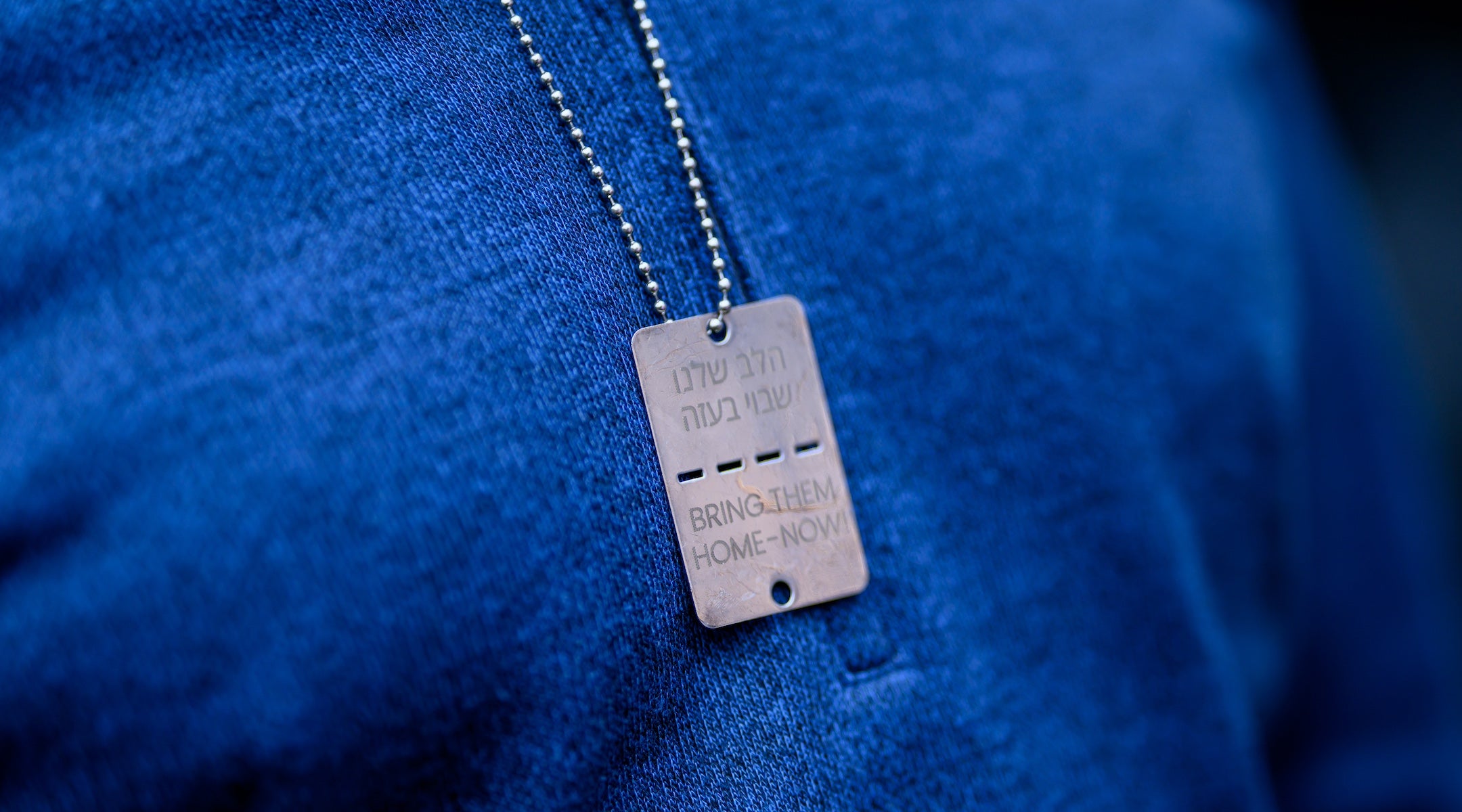
A man wears an IDF-style “dog tag” during a fundraiser in Westport, Connecticut, May 16, 2024. (Roy Rochlin/Getty Images)
The additions and changes that persist usually speak to other events, the way Av HaRachamim has become a weekly reminder of various Jewish tragedies. In general, however, a prayer or ritual that responds to current events “should have a theoretical timestamp for when it exits stage left, even if we cannot always know when that time will come,” Rabbi Ethan Tucker, president and rosh yeshiva of Hadar, explained in a Facebook post discussing the transition away from Oct. 7 practices. “Without that foresight and planning, the addition either straggles on, eventually becoming a kind of exhibit in the gallery of prayer, or it simply fades away when monotony and detachment have gotten the better of it.”
How are you, your synagogue or Jewish institution marking the release of the hostages? Drop us a line at newsdesk@jta.org.
The Jewish calendar itself seemed to conspire in the spiritual turbulence of many Jews: The hostage release came on the eve of Israelis’ celebration of Simchat Torah — and the second anniversary, on the Hebrew calendar, of the Hamas attacks.
The holiday is meant to be a day of unbridled joy. A centerpiece of Simchat Torah is the hakafah, when congregants dance with and around the Torah scrolls.
Last year, congregations struggled with how to match the happy themes of the holiday with the one-year anniversary of the worst attack in Israel’s history. Olitzky said his congregation began last year’s Simchat Torah festivities with a “solemn” hakafah, where congregants sang Israel’s national anthem and a somber Hebrew song while standing still. Olitzky said he took solace at the time in the words of Goldberg-Polin, who said, “‘There is a time to sob and a time to dance’ and we have to do both right now.”
And while the release of the hostages is also tinged with sadness — for the lost years, the captives who didn’t make it, the suffering still to come — many will use the holiday as a celebration of deliverance and gratitude.
The release of the hostages, Olitzky said, will “allow Simchat Torah to be that — the holiday when we are supposed to have so much joy. Last year it was difficult to find that joy on Simchat Torah. I truly believe that we will have a greater opportunity in the days ahead to sing and dance.”
Adat Shalom, a Reconstructionist synagogue in Bethesda, Maryland, will use Simchat Torah to celebrate the hostages’ return by ending another common practice since Oct. 7: a chair left empty on the synagogue’s bima, featuring the image of a missing hostage.
During the dancing on Simchat Torah, marked on Tuesday night outside of Israel, the congregation will bring the chair and use it to lift up members wedding-style. “We have a lot of people in the community who are really close with the Hostages and Missing Families Forum in Washington,” said Rabbi Scott Perlo. “We’re going to take that very chair, and take it from its depths and lift it up, and make it the centerpiece of our joy.”
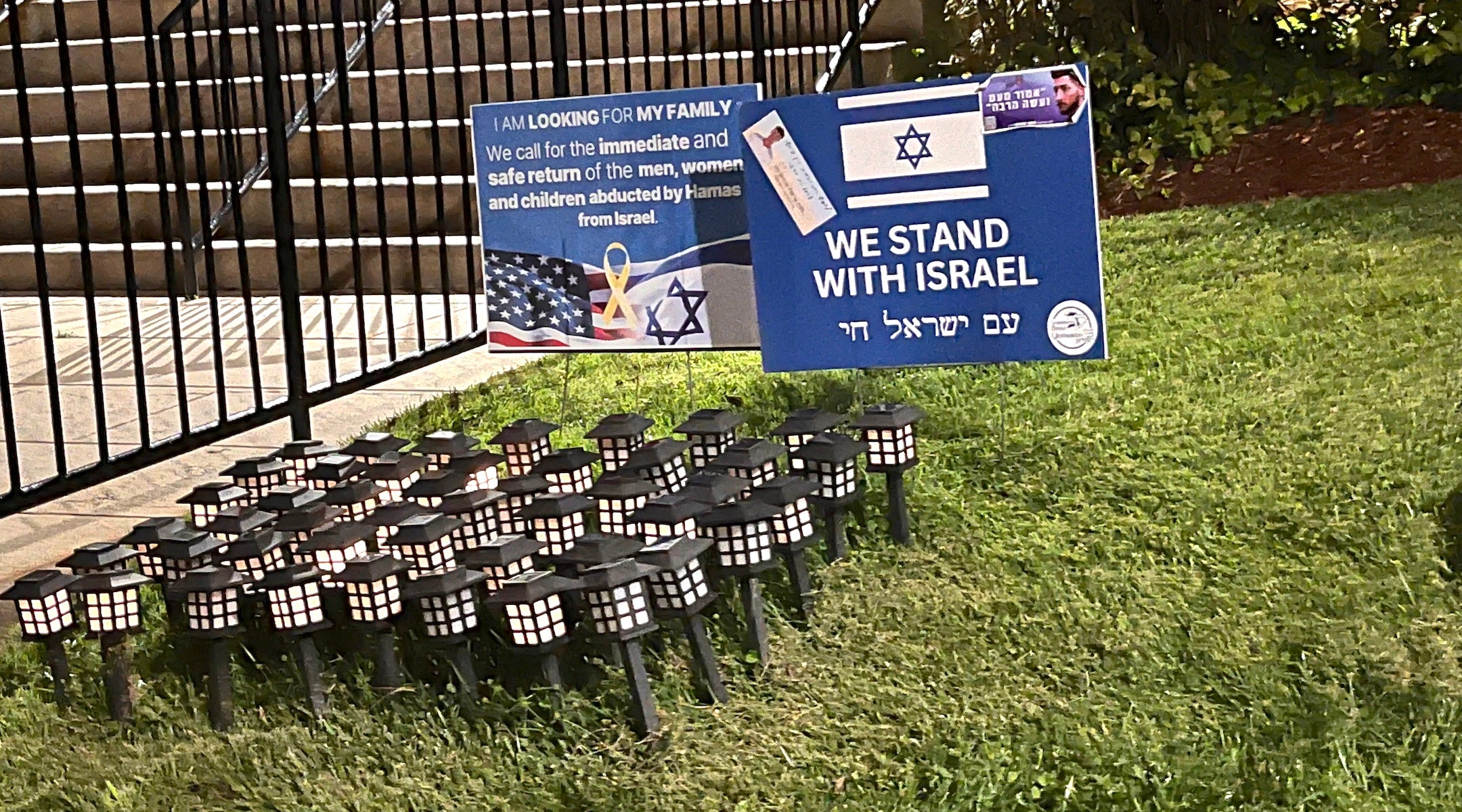
A synagogue in Teaneck, New Jersey displays lanterns representing the hostages still alive in Gaza and the bodies of those who were also slated to be returned under a deal between Israel and Hamas, Oct. 8, 2025. (JTA photo)
Adat Shalom rotated in a number of special prayers and readings over the past two years, acknowledging, Perlo said ruefully, that “there’s so much to pray for,” including “the hostages, the safety of our family in Israel, the safety of people in Gaza,” and the state of American democracy.
He understands that some congregants may be wary of letting go of the new rites and prayers — perhaps afraid that if they don’t keep up the tradition, the horrors that prompted their prayers will only return.
“So what I would say to them is some version of, ‘Yes, don’t let it go completely, but let it transform into something new,’” said Perlo.
Rabbi Felipe Goodman of Temple Beth Sholom in Las Vegas, Nevada also plans to incorporate a ritual of release and transformation during Simchat Torah celebrations on Tuesday night. He’s asking congregants to bring their yellow pins and dog tags and place them on an heirloom Torah cover. “This cover will be dedicated as a memorial and displayed at the entrance of our Temple, so that every time we walk through Our Temple’s doors, we will remember what happened on Oct. 7, 2023,” he wrote in a message to members.
With the release of the living hostages fulfilling two years of prayers, gestures and vigils, many offered new words and actions to mark the transition from war to whatever follows in its place. On Sunday, Hanna Yerushalmi, a rabbi based in Annapolis, Maryland, shared a poem on Instagram, called “Yellow Chairs,” that welcomed the transformation of the fraught symbols of Oct. 7 grief and remembrance. It reads in part:
Empty chairs will be
saved for friends arriving late,
and tape will be
tape again,
and hostage necklaces
will be put away, forgotten in drawers.
and Saturday night will be date night once again.
The war in Gaza is over. The battle to stop Israel from becoming Sparta is just beginning.
Now that the war in Gaza appears to have come to an end and Hamas has returned the remaining 20 living hostages to their families, we can fully expect Israel’s enemies and other critics across the globe to turn their attention to the declared intention of some of the extremist members of the Israeli government to formally make the West Bank part of a greater Israel that stretches from the Jordan River to the Mediterranean.
Except, of course, that President Donald Trump seems to have preemptively put the kibosh on any such scenario. “I will not allow Israel to annex the West Bank,” Trump told reporters two weeks ago. “It’s not going to happen.”
Trump realizes and has said out loud the simple truth that Israeli Prime Minister Benjamin Netanyahu and his acolytes stubbornly ignore: Israel cannot endure in the long run by permanently subjugating the Palestinian population of the territories it has held since the June 1967 Six-Day War. More importantly, as Trump told Netanyahu in a telephone conversation this past week, “Israel can’t fight the world.” Or as he told Netanyahu during his speech to the Knesset on Monday, “Be a little bit nicer, Bibi, because you’re not at war anymore. … You don’t want to have to go through this again.”
An Israeli – or Jewish – hegemony over what was once the biblical land of Judea and in due course morphed into pre-1948 British Mandatory Palestine is not and has never been the goal of mainstream Zionism as conceived and understood by the likes of Theodor Herzl, Chaim Weizmann, David Ben-Gurion and Louis D. Brandeis. But with the concept and essence of Zionism widely misunderstood or deliberately mischaracterized, it is more critical than ever to place the broad and multifaceted nature of this ethnocultural ideology in its accurate historical context.
We know whereof we speak. We are both unabashed Zionists who unequivocally identify with the State of Israel even though we radically disagree with the extremist ideology and many of the policies of its present government. One of us is a former national president of the Labor Zionist Alliance and past member of the Zionist General Council which oversees the work and activities of the World Zionist Organization. The other has been a visiting professor at both the Hebrew University in Jerusalem and Tel Aviv University, and maintains ongoing relations with both. We are long-time supporters of the Israeli-Palestinian peace process. One of us met with Yasser Arafat and senior leaders of the Palestine Liberation Organization together with four other American Jews in Stockholm in December 1988, resulting in the PLO’s first public acceptance of Israel as a state in the Middle East. The other is presently writing a book on the early socialist founders of modern Israel.
Trump’s above-quoted comments regarding the West Bank came against the backdrop of an earlier pronouncement by Netanyahu in which he resurrected the old meme of Israel as latter-day Sparta. Acknowledging Israel’s ever-increasing political and economic isolation in consequence of what then still seemed as his government’s seemingly interminable war in Gaza, Netanyahu declared that his country “will increasingly need to adapt to an economy with autarkic characteristics” and become a “super-Sparta.”
Had Netanyahu’s reference been to Plutarch’s account of the ancient Greek polity — a society highly unified, disciplined, and militarily formidable when existentially threatened – then perhaps, fair enough. The problem with his analogy, however, is what it leaves out: First, that Sparta’s hegemonic dominance was decisively and permanently ended by its catastrophic defeat at the hands of a far superior Theban army at the Battle of Leuctra in 371 BCE. And, more importantly, second, that Israel was meant by its socialist founders to emulate Athens more than Sparta, and that most of its population longs to return to this “Athenian normal” even as its current leaders try to force it into a Sparta-only straight-jacket.
There are, in short, two conflicting contemporary visions of Israel that can, when taken in “absolutist” fashion, distort understandings of both the Athenian and the Spartan aspects of today’s Israel. Peace, progress and prosperity await both refinement and synthesis of both visions.
The first vision, part of which was at the core of the Labor-Zionist-guided establishment of Israel under U.N. auspices in 1948, is of a democratic polity rooted in not only the quintessentially Jewish values of justice and social solidarity but also, equally important, a Jeffersonian-republican model of social democracy pursuant to which religiously and ethnically diverse groups coexist and co-govern as a matter of course.
This vision requires updating in one subtle respect to stay true to the Israel-as-Athens picture: namely, by supplementing the largely pastoral-agricultural imaginary of Israel’s primarily kibbutznik Labor-Zionist founders (not to mention of Jefferson himself) with a now-fuller and more productively-diversified picture of the Israel now widely called, among tech visionaries and others, the “Startup Nation.” This we must do if we are to understand both the motivations and, indeed, the promise of the Abraham Accords with their vision of a vibrantly revived Mediterranean-Levantine civilization the likes of which hasn’t been seen since the days of the ancient Phoenicians.
The second, borderline-apocalyptic vision of Israel now dominant in today’s Netanyahu-led Israel government is that of a fundamentalist Jewish hegemony over the entire biblical territory that encompasses not only Israel but the West Bank as well – “From the River to the Sea for Jews and Jews Only,” as it were. This is the pseudo-messianic model that Netanyahu and the shots-calling extremist far right members of his government are working feverishly and openly to bring about at the expense of Israel’s Jewish and non-Jewish citizens alike — not to mention its neighbors, its standing in the international community, and even the interests of Jews across the globe.
This vision requires far more radical revision to do justice to a plausible — and indeed desirable — Spartan comparison than does the original Labor-Zionist vision to do justice to a plausible Athenian comparison. Indeed, an accurate Spartan vision would have to be as Jeffersonian as the Athenian model: It would be that of a republic of citizen-soldiers able to mobilize on short notice, “Minute Man” style, when threatened, but otherwise going about the business of producing, inventing, arguing (these are Israelis, after all), and governing under the rule of law just as the ancient Israelite leaders were anointed only on condition that they rule under then-Hebrew law.
Happily, there are hundreds of thousands of Israelis who not only reject the Netanyahu government and its (distorted) “Super-Sparta” policies, but also have consistently taken to the streets against it since long before Hamas’ terrorist savagery on Oct. 7, 2023. These Israelis have sought to block Netanyahu’s attempt to eviscerate their country’s independent judicial system. They are the ones who called consistently for the ceasefire in Gaza that has now been reached and that will hopefully result in a pathway to a viable Israeli-Palestinian coexistence. And they are among those whom, alas, the likes of Hollywood actors Javier Bardem, Emma Stone,and Hannah Einbinder seek to boycott.
Israel’s aforesaid enemies, for whom a putative “anti-Zionism” they do not begin to comprehend or deliberately distort is an article of blind and blinded faith, seem either cognitively unable or perversely unwilling to distinguish between anything-but-Athenian neo-fascists like Israeli Finance Minister Bezalel Smotrich and Internal Security Minister Itamar Ben-Gvir who want to destroy Israel’s democracy on the one hand, and the likes of Israeli President Isaac Herzog and opposition leader (and former prime minister) Yair Lapid, among others — who work to preserve that democracy — on the other hand. And in his heart of hearts, we fear, Netanyahu desperately wants the world to see only the former and never the latter.
Nahum Goldmann, then president of both the World Zionist Organization and the World Jewish Congress, pointedly observed, in the wake of Israel’s June 1967 “Six-Day War,” that Israel cannot prevail exclusively as “the Sparta of the Middle East.” He was right. Israel must be both Athens and Sparta — and it must be the actual, not the children’s book, version of both. Netanyahu does not seem to “get” this. Nor, sadly, do some of those who support New York City mayoral candidate Zohran Mamdani, who in endorsing a “global intifada” are, wittingly or otherwise, effectively calling for the elimination of Israel altogether and thereby perpetuating Netanyahu’s comic-book Sparta government with all the apocalyptic horrors that this entails.
The road ahead will not be easy even after the Gaza war is in the rearview mirror and it will not be short, but if there is to be any hope for the future, the leaders of both sides of the Israeli-Palestinian conflict must embark on it by recognizing each other’s humanity and seeking to emulate Athens more and Sparta less.
Iran, Abraham Accords and Bibi’s trial: What Trump said in his historic Knesset speech
As the last of the Israeli hostages were released from Gaza, President Donald Trump addressed the country’s parliament — and was given a hero’s welcome.
Trump’s speech to the Knesset on Monday offered effusive praise for the state of Israel, warm — but not unguarded — praise for Prime Minister Benjamin Netanyahu, and an outline for a vision of a future in which Israel is a full partner of every other nation in the region. And in typical Trump fashion, it was delivered with a mixture of bravado and unpredictable asides, some of which cut at the heart of several tensions in the Middle East.
Here are the big takeaways from Trump’s speech to the Knesset.

Thousands gather at Hostage Square to celebrate the return of the hostages, October 13, 2025. (Miriam Alster/Flash90)
‘You’ve won’
With the hostages released, Trump made clear that, in his view, the era of Israeli military action in Gaza is over.
“Israel, with our help, has won all that they can by force of arms,” he said. “You’ve won. I mean, you’ve won. Now it’s time to translate these victories against terrorists on the battlefield into the ultimate prize of peace and prosperity for the entire Middle East.”
Speaking of the hostages later, the president reflected on meeting with their families and the spirit he saw igniting them.
“Over the past two years, I’ve met many of the families of the Israelis taken hostage and those that were taken hostage, unbelievable. I’ve looked into their eyes. I’ve seen the worst nightmares of their suffering, but I’ve also seen something else, the beautiful love of the people,” he said. “It’s that love that’s defeated the enemies of civilization, built this incredible country and this unbelievable economy and forged one of the great democracies of the world.”
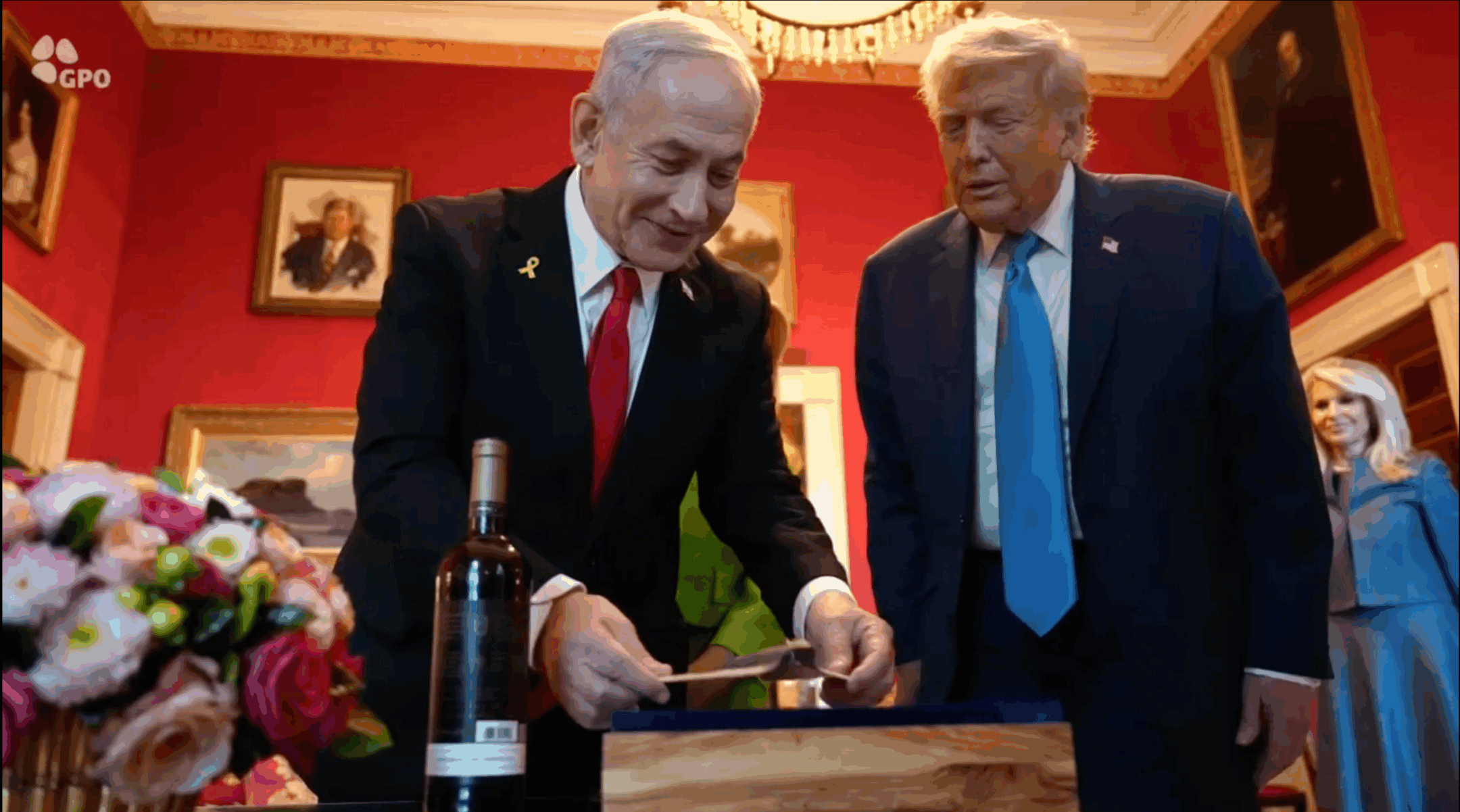
Israeli Prime Minister Benjamin Netanyahu presents U.S. President Donald Trump with a mezuzah in the shape of a B-2 bomber at the White House, July 7, 2025. (Screenshot from GPO footage)
‘You could be a little bit nicer, Bibi’
Amid reports that Trump had been frustrated by Netanyahu’s pace in negotiations to end the war in Gaza, the president had broadcast total alignment with Jerusalem. He had Netanyahu by his side at the White House last week when he announced that Israel had agreed to a ceasefire proposal that would be presented to Hamas, which later signed on. He invited Netanyahu into his motorcade on his way from Ben Gurion airport to the parliament building on Monday.
And he began his speech by praising Netanyahu — but not as effusively as he might have.
“I want to express my gratitude to a man of exceptional courage and patriotism whose partnership did so much to make this momentous day possible. You know what I’m talking about. There’s only one prime minister, Benjamin Netanyahu,” Trump said. “He is not easy. I want to tell you he’s not the easiest guy to deal with, but that’s what makes him great.”
Later, as he praised opposition leader Yair Lapid as a “very nice guy,” Trump reacted to the reaction he perceived in Netanyahu and offered a rebuke.
“Now you can be a little bit nicer, Bibi, because you’re not at war anymore, Bibi, you did it.”
Bibi’s trial
Even while alluding to his frustrations with Netanyahu, Trump still took a moment to stump for him in the prime minister’s still-ongoing trial for political corruption. Turning to Israeli President Isaac Herzog at one point, Trump made a highly unusual show of intervening in the case, calling on him to use his pardon powers to settle the matter.
“Hey, I have an idea. Mr. President, why don’t you give him a pardon?” Trump said, to hoots and applause. “Give him the pardon. Come on.”
As chants of “Bibi!” could be heard, Trump continued, “It’s not in the speech, as you probably know, but I happen to like this gentleman right over here. And it just seems to make so much sense. You know, whether we like it or not, this has been one of the greatest wartime presidents.”
Trump then made specific reference to some of the bribery charges against Netanyahu, one of the cases that a large movement of Israeli protesters — including many hostage families — had cited as a reason why the prime minister should cede power.
“And cigars and champagne, who the hell cares about that?”
The U.S.-Israel relationship
As the war dragged on, segments of both the left and right in American politics have begun to question U.S. support for Israel. Trump vocally reaffirmed the bond.
“Israel will always remain a vital ally of the United States of America,” he said. “Israelis share our values, field one of the world’s most powerful militaries. You really do.” He added, “I’m proud to be the best friend that Israel has ever had.”
He also referenced the U.S. citizens who were abducted in Gaza in what he noted was “the worst slaughter of Jews since the Holocaust,” painting American and Israeli grief over Oct. 7 as one and the same.
“The United States of America grieved alongside you, and we mourn for our own citizens who were so viciously taken that day,” he said. “And to all the families whose lives were forever changed by the atrocities of that day, and all of the people of Israel, please know that America joins you in those two everlasting vows: Never forget, and never again.”
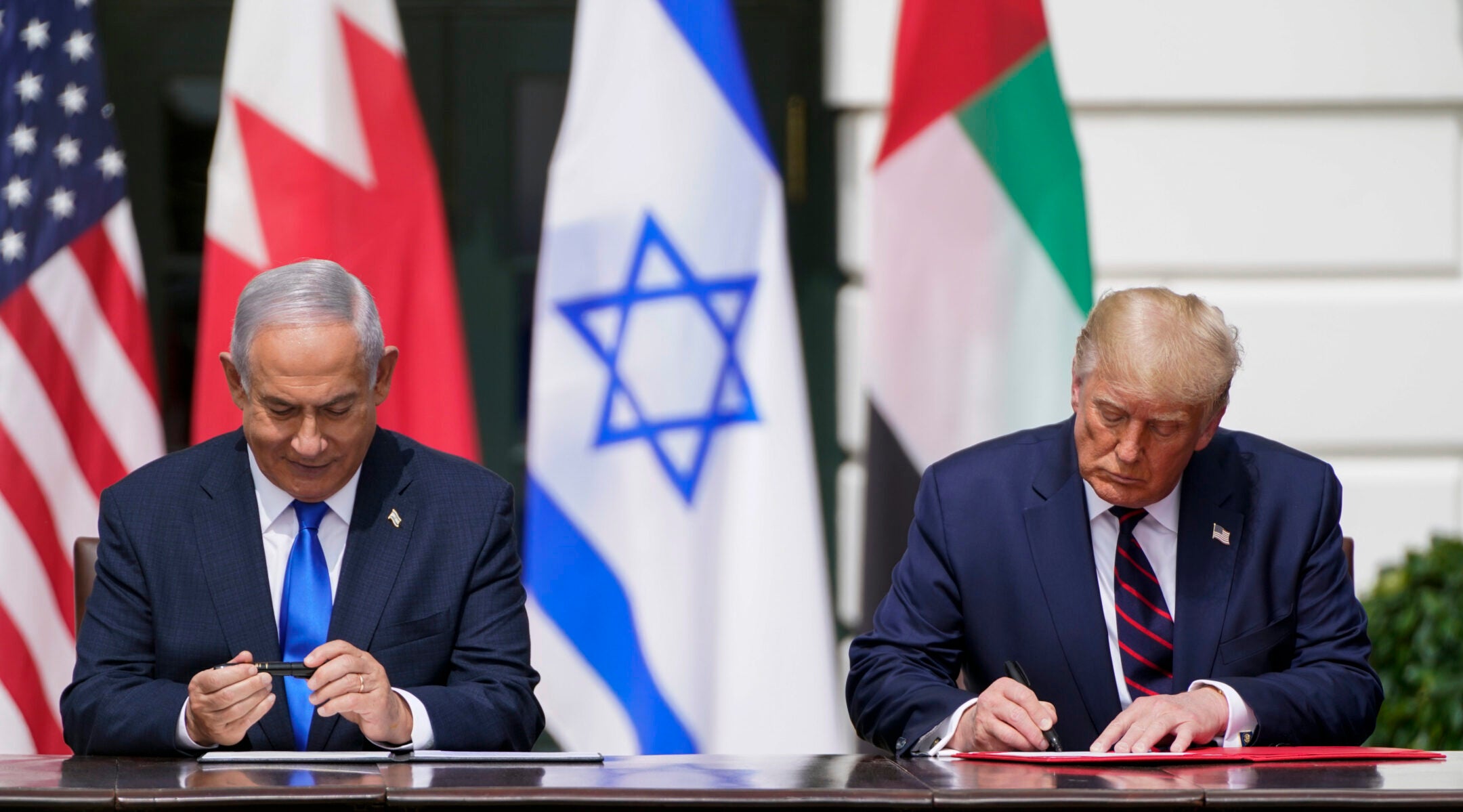
President Donald Trump and Israeli Prime Minister Benjamin Netanyahu sign the Abraham Accords at a White House ceremony, Sept. 15, 2020. (Jabin Botsford/The Washington Post via Getty Images)
What’s next for the ‘Avraham Accords’
At various points during his speech, Trump turned to his first administration’s signature foreign-policy accomplishment: the normalization agreements between Israel and a handful of Arab states, known as the Abraham Accords. On Monday he pronounced it the Hebrew way, “Avraham.”
“I like calling it the Avraham Accords. Avraham. It’s so cool. It’s so much nicer, you know? The Abraham versus the Avraham,” he said.
In the wake of what he said would be a concentrated rebuilding effort in Gaza, Trump also urged Israel and several Arab and Muslim nations to add to these accords. “Now we’re going to forge a future that is worthy of our heritage. We’re going to build a legacy that all the people of this region can be proud of,” he said.
“So instead of building fortresses to keep enemies at bay, the nations of this region should be building infrastructure to weave your commerce closer together, because you’ve got to compete with a big world out there in commerce. Now it’s a different kind of competition. Instead of making weapons and missiles, the wealth of this region should flow to schools and medicine, industry. And frankly, the new hot thing, artificial intelligence.”
Toward the end of his speech, Trump provided a list of countries and their capitals he said he would like to see forge stronger relations with Israel and each other. Some of them already have diplomatic ties to the country.
“New bonds of friendship, cooperation and commerce will join Tel Aviv to Dubai, Haifa to Beirut, Jerusalem to Damascus, and from Israel to Egypt, from Saudi Arabia to Qatar, from India to Pakistan, from Indonesia to Iraq, from Syria to Bahrain, Turkey to Jordan, the United Arab Emirates to Oman and Armenia to Azerbaijan,” he said.
How such an ambitious realignment would play on the larger diplomatic stage, as many countries remain furious at Israel for its handling of the Gaza war, remains to be seen. The president of Indonesia, one Muslim-majority nation long in discussions to join the accords, scuttled a planned historic visit to Israel Monday over reported concerns of pushback at home, though he attended the day’s summit between Israel and Hamas held in Egypt.
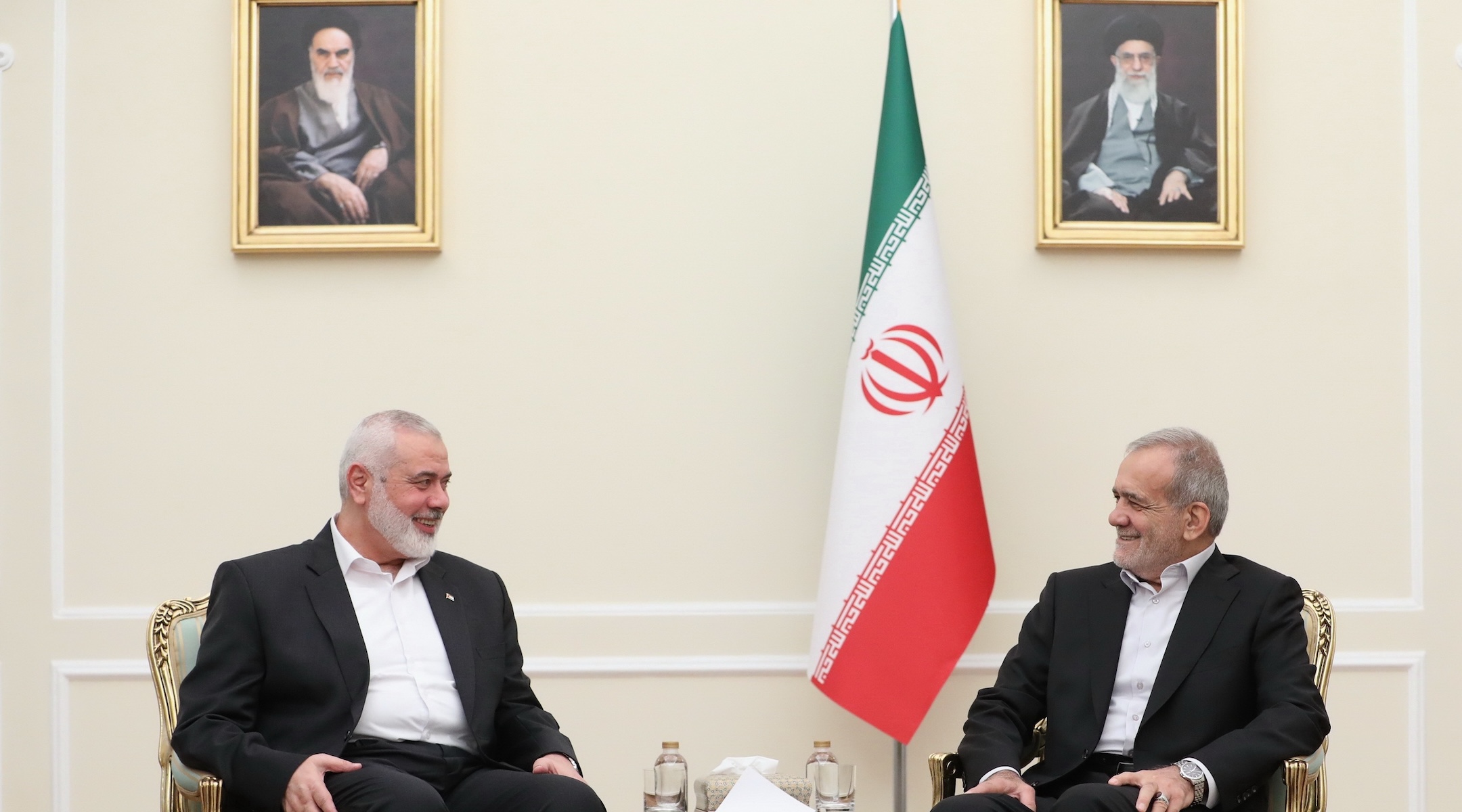
Iranian newly-elected President Masoud Pezeshkian, right, meets Head of the Palestinian Hamas group’s political bureau Ismail Haniyeh, left in Tehran, Iran on July 30, 2024. (Iranian Presidency / Handout/Anadolu via Getty Images)
‘Make a deal’ with Iran
Amid talks of normalization, Trump paid special attention to the elephant in the room by urging the Knesset to use their momentum to “make a deal” with Iran, which both the United States and Israel had bombed at various times during the Israel-Gaza war.
“And even to Iran, whose regime has inflicted so much death on the Middle East, the hand of friendship and cooperation is open,” he said. I’m telling you, they want to make a deal.”
“Neither the United States nor Israel bear the people of Iran any hostility,” Trump continued. “We merely want to live in peace. We don’t want any looming threats over our heads.”
The moment stood out, as both the United States and Israel have had fraught relationships with Iran for nearly half a century. Netanyahu spoke to Congress in an effort to unravel a nuclear deal with Iran during the Obama administration; that deal wound up going through, only to be scuttled by Trump in his first term in office. Trump himself acknowledged this with some dark humor.
“As president I terminated the disastrous Iran nuclear deal, and ultimately I terminated Iran’s nuclear program with things called B-2 bombers,” he said. Yet, Trump pressed on, now a new deal should be reached, one predicated on Israel’s strengths.
He added, “A lot of Iranians in the United States are good people, smart, hardworking people. They don’t want to see what’s happened to their country. The story of fierce Israeli resolve and triumph since Oct. 7 should be proof to the entire world that those who seek to destroy this nation are doomed to bitter failure. The State of Israel is strong and it will live and thrive forever.”
Bibi’s demand for weapons
Trump was open about one aspect of U.S. support for Israel that had received particular scrutiny and protest during the war: the transfer of weapons for Israel to use in Gaza.
“We make the best weapons in the world, and we’ve got a lot of them, and we’ve given a lot to Israel, frankly,” he said. Deeming himself “all about stopping wars,” Trump said he “hated” some of the weapons the United States makes “because the level of power is so enormous, so dangerous, so bad.”
Yet, Trump said, the United States gave Israel all the weapons it needed. He even ribbed Netanyahu’s desire for military supplies.
“I mean, Bibi would call me so many times: ‘Can you get me this weapon, that weapon, that weapon?’ Some of them I never heard of, Bibi. And I made them,” Trump said. “But you used them well. It also takes people that know how to use them, and you obviously use them very well, but so many that Israel became strong and powerful, which ultimately led to peace. That’s what led to peace.”

Israeli-American billionaire Miriam Adelson is recognized during a special plenum session in honor of U.S. President Donald Trump at the Knesset, the Israeli parliament in Jerusalem, on October 13, 2025. (Yonatan Sindel/Flash90)
Miriam Adelson
Trump gave a special shout-out to one of his wealthiest and most stalwart pro-Israel donors in the United States, Miriam Adelson — widow to casino magnate Sheldon. While praising her, he also suggested she “loves” Israel more than the United States — flirting with the kind of “dual loyalty” trope that mainstream Jewish organizations have tended to condemn in the past.
The Adelsons, he said with an unusual degree of candor for a president referencing a top financial backer, had been a large influence on his Israel policy.
“I kept my promise and officially recognized the capital of Israel and moved the American embassy to Jerusalem,” Trump said, to applause. “Isn’t that right, Miriam?” He then urged Adelson to “stand up” for recognition.
During his first term, Trump told the Knesset, “Miriam and Sheldon, they would come into the office… I think they had more trips to the White House than anybody else. Look at her sitting there so innocently. She’s got $60 billion in the bank… But she loves Israel. And they would come in, and her husband was a very aggressive man, but I loved them.”
Trump described his relationship with the Adelsons as one where they would needle him to drop by the White House. “He’d call up, ‘Can I come over and see you?’ I’d say, ‘Sheldon, I’m the president of the United States. It doesn’t work that way.’ He’d come in,” the president said. “But they were very responsible for so much.”
“I’m going to get in trouble for this,” Trump said. “But I actually asked her once, I said, ‘So, Miriam, I know you love Israel. What do you love more? The United States or Israel?’ She refused to answer. That means, that might mean Israel.”
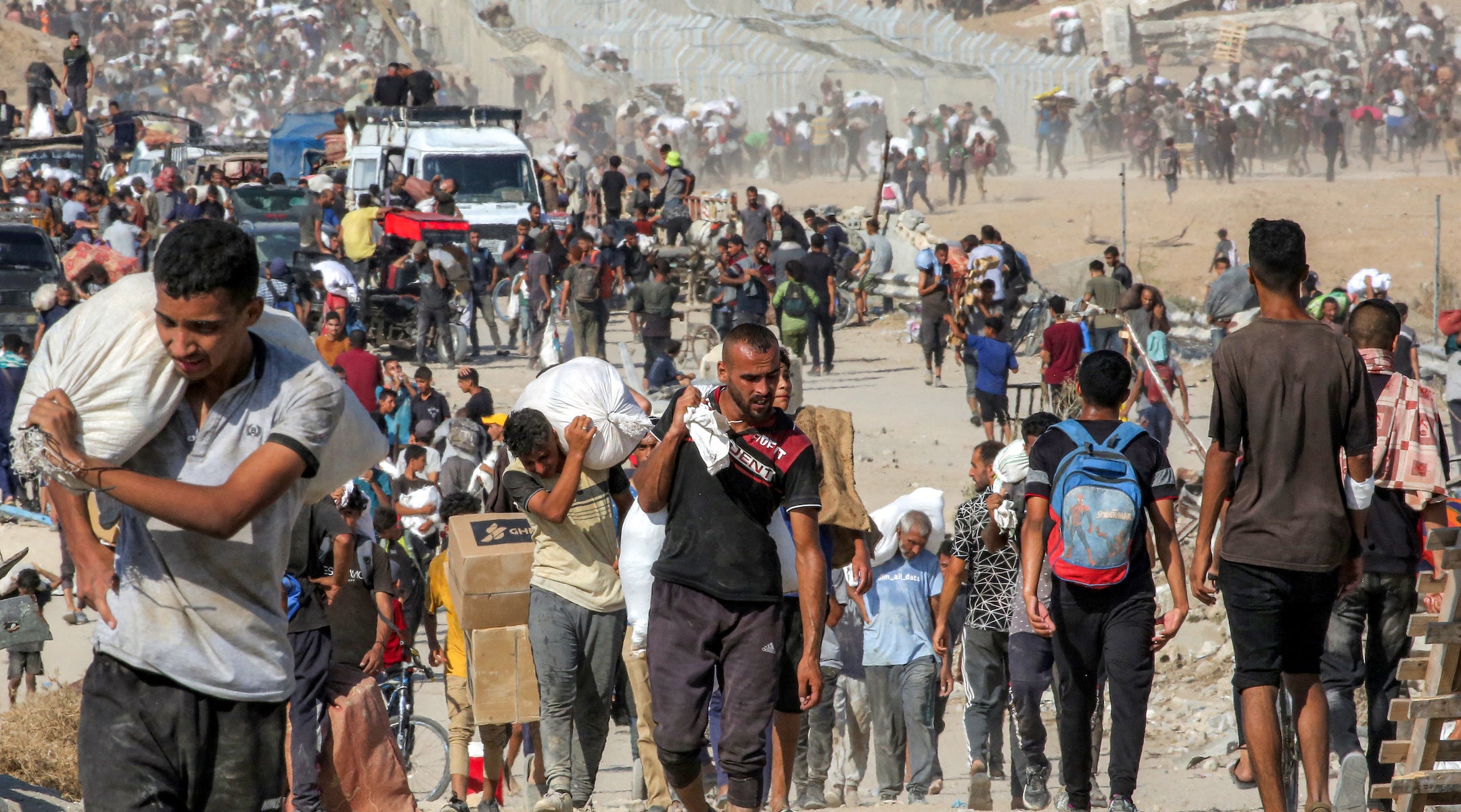
People walk with bags of humanitarian aid they received at a distribution centre run by the US and Israeli-backed Gaza Humanitarian Foundation (GHF), as they cross the so-called “Netzarim corridor” in the central Gaza Strip, on August 22, 2025. The United Nations officially declared a famine in Gaza on August 22, the first time it has done so in the Middle East, with experts warning 500,000 people face “catastrophic” hunger. UN agencies have long been warning of the deteriorating humanitarian situation in Gaza, particularly as Israel steps up its offensive against Hamas. (Eyad Baba / AFP)
The word on Gaza, and ‘the Board of Peace’
When Trump’s remarks touched on what should come next for Gaza, he painted his vision as one of international cooperation and prosperity, should the Palestinians want it.
Says several “very wealthy” Arab and Muslim nations have committed “to support a safe gilding of Gaza and beyond,” Trump added, “The total focus of Gazans must be on restoring the fundamentals of stability, safety, dignity and economic development so they can finally have the better life that their children really do deserve after all these decades of horror. I intend to be a partner in this effort.”
The “day after” plan for Gaza was one of the major sticking points of the negotiations between Israel and Hamas, the latter of which has not committed to relinquishing control of the territory despite Trump and Israel’s demands. Some members of Israel’s far-right governing coalition, meanwhile, have urged for the expulsion of all Palestinians and for Israel to control or resettle the strip.
In the past, Trump has promoted the idea of the United States, or his personal business interests, taking Gaza for itself and turning it into a resort. His tone was more measured in the Knesset, saying his plan for rebuilding Gaza involved a “board of peace” that would be “unbelievably popular.”
“Is that a beautiful name? Like a board, of peace,” he said. “The only bad thing, from my standpoint: every single nation involved has asked me to be the chair. And I’ll tell you, I’m very busy. I didn’t count on that.”
Trump framed Gaza’s future as one up to Palestinians.
“The choice for Palestinians could not be more clear,” he said. “This is their chance to turn forever from the path of terror and violence, it’s been extreme, to exile the wicked forces of hate that are in their midst. And I think that’s going to happen.”
Jared and Ivanka
How much does Trump’s Jewish son-in-law, Jared Kushner, love Israel? “He loves it so much that my daughter converted,” the president said.
Trump continued to riff on Ivanka’s conversion for a while. “I didn’t know this was going to happen,” he said. “And she is so happy, and they are so happy, at least, I think they’re happy. If they’re not, we have a big story, right?”
Israelis are comparing Trump to Cyrus the Great – again
As their last living hostages returned home from Gaza after two years of war, Israelis gave visiting President Donald Trump a hero’s welcome — and threw out some lofty comparisons.
“Mr. President, you stand before the people of Israel not as another American president, but as a giant of Jewish history — one for whom we must look back, two-and-a-half millennia into the mists of time, to find a parallel, in Cyrus the Great,” Amir Ohana, speaker of the Knesset, told Trump on Monday as he welcomed the president for a victory speech to the Israeli parliament.
To be compared to Cyrus is no small thing. Living around 600 BCE and shrouded in myth, the Persian ruler is traditionally credited with granting Jews permission to return from exile in Babylon to the land of Israel and for helping them to rebuild the temple in Jerusalem. Because Cyrus was a pagan who by force seized and ruled over a vast empire, he tends to be treated as an imperfect yet essential vessel for God’s divine plan for the Jews, and is widely celebrated in Jewish history.
It’s a comparison that Israeli Prime Minister Benjamin Netanyahu has also made. Visiting the White House in 2018 during Trump’s first term, shortly after the president moved the U.S. embassy from Tel Aviv to Jerusalem, Netanyahu situated Trump in a long line of friendly world leaders including Cyrus, Lord Balfour and President Harry Truman — all of whom he said helped return the Jews to their rightful homes in Israel. At the time a Jewish Israeli group, the Mikdash Educational Center, started selling commemorative coins imposing Trump’s face over Cyrus’s.
The Cyrus framing has also helped Christian Zionists embrace Trump since his first term, despite the community’s initial misgivings about Trump’s personal behavior and often crude demeanor.
In 2018 the Evangelical leader Mike Evans, who founded the Jerusalem-based Friends of Zion Museum, declared that Cyrus “was used as an instrument of God for deliverance in the Bible, and God has used this imperfect vessel, this flawed human being like you or I, this imperfect vessel, and he’s using him in an incredible, amazing way to fulfill his plans and purposes.”
As the return of the living hostages seemed imminent, Evans’ group placed “Cyrus the Great is Alive!” billboards in Jerusalem. The billboards feature images of Trump and the American and Israeli flags intertwined.
Its sukkah lost to devastating wildfire, Pasadena Jewish Temple and Center builds a new one with help from friends
When the Eaton wildfires in Southern California razed the Pasadena Jewish Temple and Center last January, its Torahs were all that remained.
That meant the synagogue was in the market for a new sukkah this month when the harvest holiday of Sukkot neared. It found one with the help of another local synagogue.
The Men’s Club of Temple Isaiah, located in Lafayette, California, near San Francisco, donated a sukkah to PJTC, a 100-year-old Conservative synagogue now operating out of temporary accommodations.
“While this past year was a tragic one for the congregants and clergy of the Pasadena Jewish Temple and Center, it has been inspiring to witness the incredible resilience and the determination of this sacred community,” said Anshei Isaiah President Andy Shapiro in a statement. “As Jews, we could think of no greater mitzvah than by helping rebuild their Sukkah and joining with our brothers and sisters to welcome the new year.”
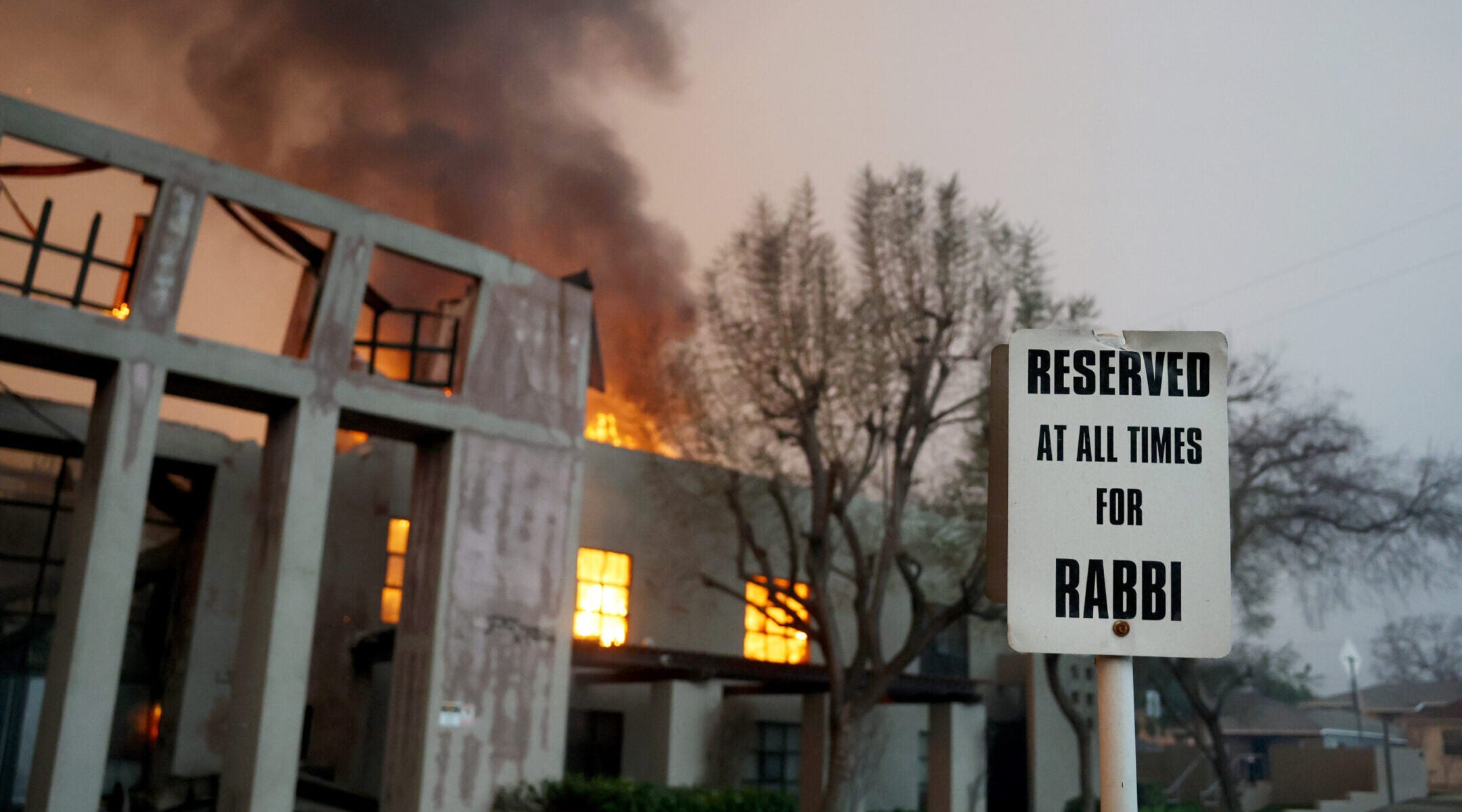
The Pasadena Jewish Temple & Center smolders after burning in the Eaton Fire in Pasadena, California, Jan. 8, 2025. (Mario Tama/Getty Images)
The sukkah, which was purchased from The Sukkah Project in Grand Junction, Colorado, was built on Oct. 5 by members of PJTC’s men’s club as well as members of Anshei Isaiah, who travelled over 350 miles to see its completion.
It was open during the holiday to PTJC’s 400 families, who are reeling from a fire that devastated their community. The synagogue has plans to rebuild on its former site.
Last Monday, on the first day of Sukkot, the two congregations participated in a joint virtual observance in their sukkahs.
“We are all one interconnected Jewish family,” said Temple Isaiah’s Senior Rabbi Jill Perlman in a statement. “Building the sukkah for our community has long been a beloved yearly tradition of our men’s club here at Isaiah, and I am glad they are able to share the love of this tradition with Pasadena Jewish Temple and Center through the donation of a sukkah.”










